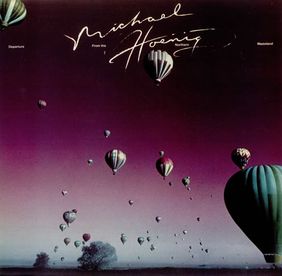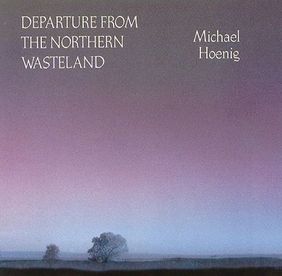 |  | |||||||||||||||||||||
Michael Hoenig Departure From The Northern Wasteland- Studio, released 1978 - | |||||||||||||||||||
Covers |
| ||||||||||||||||||
Tracks |
| ||||||||||||||||||
Details |
| ||||||||||||||||||
Notes | "Repetition is the image of Eternity in music The music of the past justifies Itself for its limitation The music of the future is Sparing itself this effort" | ||||||||||||||||||
A short time after leaving Tangerine Dream, Michael Hoenig started a short collaboration with Klaus Schulze (as a duo called Timewind), and then with Manuel Göttsching from Ash Ra Tempel (which eventually resulted in the release of Early Water). Finally, in late 1976 he started to work on a solo release that would become Departure From The Northern Wasteland -- by many fans of electronic music regarded as a classic album of the Berlin School style. Michael Hoenig was supported on guitars by two former band mates from Agitation Free -- Lutz Ulbrich and Micki Duwe. The latter wrote and played the lead harmonies on the track Sun And Moon, while Lutz "Lüül" Ulbrich played on the title track. The voices on Voices Of Where were performed by Uschi Obermaier, a German model, formerly of Amon Düül. | |||||||||||||||||||
In an interview with Christopher Lawless and Michael Darnell, Michael Hoenig recalls the beginning of his solo career: "The big problem right away was my publisher not releasing me to record with them [i.e. Tangerine Dream], so there went any chance to play on Rubycon. We rehearsed and went on tour in Australia, and played Albert Hall in London. After that concert, I felt that I should pursue my own course. The way Tangerine Dream worked at the time was very similar to the techniques and principles of improvisation that Agitation Free had relied on, and I was simply tired of that particular style of playing and composing. After I decided that I had all tools and ideas necessary to work totally by myself, I simply started developing my own material, and after some radio and theater work all efforts of that time ultimately resulted in Departure From The Northern Wasteland." (Beyond the Horizon Vol. 4 No. 3, Summer 1996) | |||||||||||||||||||
In the same interview he talks about the recording of his first solo album: "It started with condensing a lot of ideas that had meandered in various incarnations through my mind and some long improvisations. I had also made it a habit to take notes of ideas whenever they materialized, so I had a wealth of material to start from. For a while I just did my best to get those ideas onto tape with the resources I had. The next step was finding appropriate musical shapes that would provide a more structured format for telling an imaginary story. While I recorded it, I never really thought about a final product -- I just knew I had to go through this process, summing up all the parts that so far existed only as fragments. I recorded it because I trusted that the material was interesting. Only after completion did it become obvious that the music deserved my best effort to get released as a record. To seek a record company outside Germany seemed only logical, because of the structural limitations built into that system. The route through England seemed well-traveled, and at the time nobody had done anything like it in America -- yet. [...] I remember all too well how difficult it was to make that album with the technology and the abilities I had at the time. It certainly was an exhaustive tour-de-force. I think I worked on it for ten to twelve months, but it paid off. I feel very lucky, because therein lies a remaining principle that still holds true today -- to give every project my very best, regardless of its final purpose. That period represents only good memories for me. The test of time is probably the ultimate reward. [...] The title refers to many thoughts that drifted through my mind at the time, and it can mean whatever anybody wants to put into it. The album was a true, marked departure from a certain point in my life and a certain thought process. It has multiple meanings which intimately connected to many friends, and a lot of laughter-filled brainstorming sessions searching for titles! Ultimately it's a metaphor, and it still represents everything I wanted it to be." (Beyond the Horizon Vol. 4 No. 3, Summer 1996) | |||||||||||||||||||
Michael Hoenig about a "lost" second studio album that was finished but never got released: "Warner had been extremely helpful in the beginning, but by 1979 they went through their first big round of consolidating their catalog. About forty percent of their artist roster got scrapped -- a simple bookkeeping decision that hit every artist below a certain sales figure. Despite fabulous reviews and a very inspired promotional campaign, there were simply too few radio stations outside the college circuit at the time that could play twenty-minute tunes. I considered the sales figures quite promising -- they were fabulous for European standards, but they did not make a dent for Warner. The folks at Warner were very cordial, fulfilled all their contractual obligations, but the tape they paid for is probably rotting in one of their vaults. Since I was just one of many artists that got fired at the time, it never really registered, especially because I was hired a few days later on a very promising movie project, working with Philip Glass on Koyaanisqatsi." (Beyond the Horizon Vol. 4 No. 3, Summer 1996) | |||||||||||||||||||
Releases |
| ||||||||||||||||||
Copyright/Disclaimer © 2001-2025 by Michael Berling. Last Update: 2025-01-03 17:20 |


